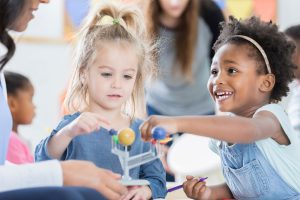Posted on March 10, 2022 by childrenslearninginstitute
Starting Significant Studies Supporting Texas Teachers and Students
The past two years have been filled with constant change and uncertainty due to the ongoing pandemic. Many routines had to be altered and some activities eliminated, affecting all our typical approaches. Research projects conducted by the Children’s Learning Institute (CLI) were hit hard by the unexpected move to remote schooling beginning in 2020, then limited campus access during subsequent months, resulting in planned research activities to be delayed until schools resumed normal operations. With the return to in-person instruction and the reduction of COVID-19 related barriers, CLI is excited to be able to move ahead with some important research, including starting work related to three recently awarded grants. As a research-to-practice institute, cutting-edge research serves as the essential foundation of all future developments by CLI.
![]()
Promoting the Social and Emotional Well-Being of Head Start and Early Head Start Education Staff Through the Cultivating Awareness and Resilience in Education (CARE) Program
Funded by the Administration for Children and Families, this grant award of over $2,100,000 funds a five-year research project, which is currently in the planning phase and will continue through September 2026. The project is led by Assistant Professor Yoonkyung Oh, Ph.D. as Principal Investigator, with Co-PI April Crawford, Ph.D., Associate Professor and Co-Director of the CLI. In close partnership with the non-profit organization CREATE for Education, the project aims to evaluate the efficacy of the CARE program for improving Head Start (HS) and Early Head Start (EHS) teachers’ social and emotional well-being; classroom process quality; and children’s social, emotional, and behavioral outcomes. CLI is particularly interested in conducting this study based on our perspective that classroom environments have a significant impact on children’s learning and development. With the increasing prevalence of teacher stress and burnout resulting in high turnover rates of HS and EHS teachers, there is large concern about the adverse impacts that these problems will have on educators themselves and the children and families they serve; during the pandemic, this concern has only increased.

Developed by Patricia Jennings, Ph.D., Christa Turksma, Drs., and Richard Brown, Ph.D., CARE is a unique and innovative professional development program that utilizes mindfulness-based approaches and emotion skills training to help teachers better manage stress and challenges of classroom teaching. The theory behind how CARE works is that improvements in teacher social and emotional well-being and competence will lead to more positive classroom environments characterized by more supportive teacher-child interactions, better organization of classroom activities and behaviors, and more effective instructional implementation, which ultimately result in improved child outcomes. Dr. Oh commented, “The CARE program is based on the idea that teacher social-emotional well-being is a necessary condition for creating healthy classroom climates and then healthy children. CARE has been proven effective in elementary school contexts and this project is the first to evaluate its efficacy in early childhood education contexts.”
Striving to support early education improvements in Texas, the study incorporates three broad goals:
- First, to adapt and refine CARE to meet the needs and circumstances of the HS and EHS programs we partner with throughout the state. Doing so should increase participants’ understanding and implementation of the CARE program components.
- Second, to conduct a randomized-controlled trial (RCT) in the 3 largest metropolitan areas in Texas with approximately 300 teachers and 1,500 children to evaluate the main impacts of CARE. The project will explore for whom and under what conditions CARE may work better.
- Third, to develop a plan to sustain and replicate CARE after the completion of the project.
More information about our newest research project can be found here.
Teaching Together: The Added Value of Tiered School Plus Home Interventions for Young Children At-Risk for Language Difficulties
Generous funding from the Institute for Education Sciences was awarded in the amount of almost $3,800,000 for a period of 4 years, through June 2025, to examine the efficacy of the Teaching Together program for pre-kindergarten children who are at risk of academic difficulties due to limited oral language skills. Led by Tricia Zucker, Ph.D., Professor and Co-Director of the Children’s Learning Institute, this study is unique in its focus on oral language supports in both classroom and home settings. The study will be conducted in North Texas with approximately 90 pre-K teachers and 540 children.
 In early childhood classrooms serving underserved students, up to 50% of children may exhibit language difficulties, which are associated with long-term challenges for reading and academic success. Previous evidence demonstrates that early language difficulties can be reduced by providing language interventions at school and home. Tiered language supports may lessen language difficulties for many prekindergarten children who need increased opportunities to build language skills, including English learners.
In early childhood classrooms serving underserved students, up to 50% of children may exhibit language difficulties, which are associated with long-term challenges for reading and academic success. Previous evidence demonstrates that early language difficulties can be reduced by providing language interventions at school and home. Tiered language supports may lessen language difficulties for many prekindergarten children who need increased opportunities to build language skills, including English learners.
Dr. Zucker has a clear focus for this study, stating, “through the application of two fully-developed language support programs, our research intends to prove the value of combining school and school-plus-home interventions in a tiered approach.” The study will include CLI’s Developing Talkers supplemental curriculum program for Tier 1 and Tier 2 classroom interventions, and the aligned Teaching Together family engagement program. This study will examine the impact of intervention intensities, and whom and under what conditions the interventions are more or less beneficial. If there are beneficial findings, researchers will make the classroom and family resources broadly available in the final year of the study.
This study builds off prior CLI projects examining the impacts of family engagement resources and programs during pre-K, conducted with the Children’s Museum Houston as a key partner. Schools can invest significant time and resources into programs that engage parents and families in children’s learning, and this line of research helps the field learn more about the efficacy of these investments. Prior Teaching Together research studies conducted by CLI can be found here and here. Materials developed during the initial Teaching Together research study are available to access at no cost on CLI Engage, as part of the family engagement toolkit.
Learn more about this ambitious and beneficial research project here.
Breaking Stereotypes Through Culturally Relevant Storytelling: Optimizing Out-of-School Time STEM Experiences for Elementary-Age Girls to Strengthen Their STEM Interest Pathways (FESTIVL)
Dr. Zucker also serves as the Principal Investigator for a four-year grant award of $2,000,000 funded by the National Science Foundation’s Advancing Informal STEM Learning program, with co-PI Gloria Yeomans-Maldonaldo, Ph.D., Assistant Professor at CLI. “Providing early STEM interest pathways for populations that are historically underrepresented in STEM fields is critical to creating gender equity in the STEM workforce,” said Dr. Zucker. “This funding will provide a space to add a component to a STEM curriculum developed by the Children’s Museum of Houston that will be focusing on young girls and diverse populations and how to promote their STEM-identity while lowering STEM-related stereotypes. At the end of the study we will be able to rigorously assess the impact of this added component when compared to the original curriculum and a business as usual condition,” said Dr. Yeomans-Maldonado. This project will target students and families from underrepresented groups who are living in poverty, building important knowledge about early pathways for reducing inequities by breaking gender stereotypes and developing early interest in STEM.
 Primarily, the project will explore how an afterschool program that combines narrative and storytelling approaches, STEM role models, and family supports spark elementary-age girls’ interest in STEM and fosters their STEM identity. A secondary aim of the project is to build capacity of schools and afterschool providers to deliver and sustain afterschool STEM enrichment experiences.
Primarily, the project will explore how an afterschool program that combines narrative and storytelling approaches, STEM role models, and family supports spark elementary-age girls’ interest in STEM and fosters their STEM identity. A secondary aim of the project is to build capacity of schools and afterschool providers to deliver and sustain afterschool STEM enrichment experiences.
Curriculum developed by the Children’s Museum Houston will be adapted for scalability and planned storytelling variations. The Afterschool Science, Technology, Engineering, Arts and Math (A’STEAM) curriculum will be used in both the original and adapted forms during the study by afterschool providers with a family engagement component. A total of 36 sites and 600+ children will be recruited to participate in two age-based groups: Kindergarten-Grade 2 and Grades 3-5. CLI will partner with Yes Prep Public Schools in Houston.
Findings will increase understanding of how to optimize out-of-school time STEM experiences for elementary-age girls and how to strengthen STEM interest for all participants. Further, this project will advance our knowledge of which approaches build capacity of afterschool providers to sustain inquiry-based, invaluable STEM programs.
Additional details about the inspiring FESTIVL study are available here.
![]()
The outcome of all these projects will radically change educational impacts across Texas. Being able to again actively pursue our research interests, especially with such notable funders, afford CLI renewed vigor and dogged determination. The focuses on improving outcomes for today’s youngest students, currently struggling bilingual students, and underserved STEM populations drive CLI to develop resources that support more equitable and inclusive early education programming. Through innovative approaches to early education research, CLI hopes to improve learning opportunities for all children.
